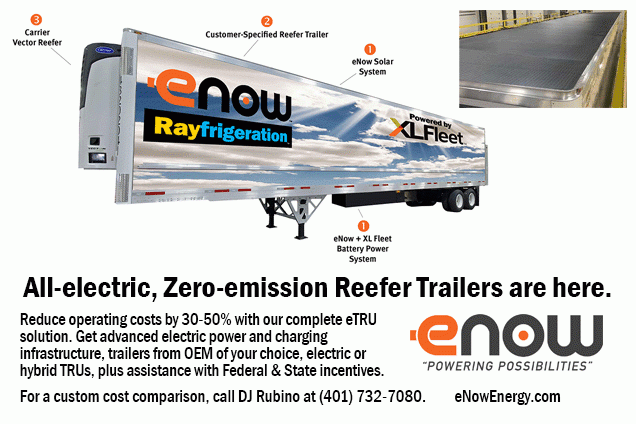President & CEO, eNow, Inc.
Why Transition to Electric Reefers Now?

There are two compelling reasons to make zero-emission, all-electric TRUs (eTRUs) part of your fleet sooner than later: economic and environmental.
First, the economics. There are currently Federal and State government incentive programs that will cover as much as 50% of the cost of new electric TRU trailers. This funding was created to promote industry acceptance of eTRU’s zero-emission technology but will only be in funded for a few more years.
eTRU’s also provide fleets reduced operating costs. Savings are due to eliminating diesel fuel and reducing TRU maintenance. Electric reefer units also have an asset life of 10-12 years compared to 5-7 years for diesel units.
Second, government environmental and emission-reduction regulations are here to stay. While California may lead the country in environmental regulations, some cities and states across the country are following suit – both with penalties for CO2 emissions and attractive incentive programs. Today, states on the opposite coast, such as New Jersey and Florida, also offer incentives to purchase or lease EVs and eTRUs, including grants, rebates, tax credits and even loans.
For some, helping the environment is enough. For others, the math makes transitioning from diesel to electric TRUs a no-brainer. So, let’s look at diesel TCO (total cost of ownership) vs. electric TCO.
Initially, early-adopters can see significant cost benefits at eTRU trailer acquisition. DERA, the federal government’s Diesel Emissions Reduction Program provides a 45 percent reimbursement for new all-electric trailers.
For fleets running primarily in California, the California Air Resources Board’s CORE program provides up to $65,000 in incentives for clean-running equipment, plus $3,000 per charging plug. California also provides up to 50 percent reimbursement of new all-electric TRUs and trailers through the Carl Moyer Memorial Air Quality Standards Attainment Program.
Incentives aside, the operating cost savings eTRUs provide are indisputable, and easily calculated.
For example, let’s assume your diesel TRU has 2,000 annual run hours, and its diesel fuel consumption is .8 gallons per hour. That equals 1,600 gallons of diesel per year. Let’s assume diesel is at $3.98 per gallon, (California diesel is currently at $4.75). Your annual diesel TRU fuel costs would be $6,368, while an all-electric TRU’s fuel cost is zero.
Now let’s add diesel TRU maintenance costs to the equation. We’ll be conservative and assume diesel TRU’s maintenance costs are only double an electric TRU’s. Assuming a cost of $1.50 per hour and 2,000 hours of run time, a diesel TRU would cost $3,000 per year to maintain (not considering downtime). Based on its simpler design, an all-electric TRU would only cost $1,500 per year.
So based on this scenario, total annual savings per TRU trailer would be $7,868 not including incentives.
On October 13th, CALSTART invited eNow and XL Fleet to address the “total cost of ownership” ––the costs, savings, and incentives for electric TRUs vs. diesel reefer TRUs. The CALSTART webinar can be seen at this link: All-Electric TRU Incentives and Total Cost of Ownership. (Note: custom-prepared diesel vs. electric TCO comparisons are available from eNow.)
eNow is delivering the most advanced zero-emission, all-electric reefer trailers in the industry. Call to request a custom-prepared cost comparison for your reefer fleet. Call DJ Rubino at (401) 732-7080.
The above article is sponsor-generated content. To learn more about sponsor-generated content, click here.


